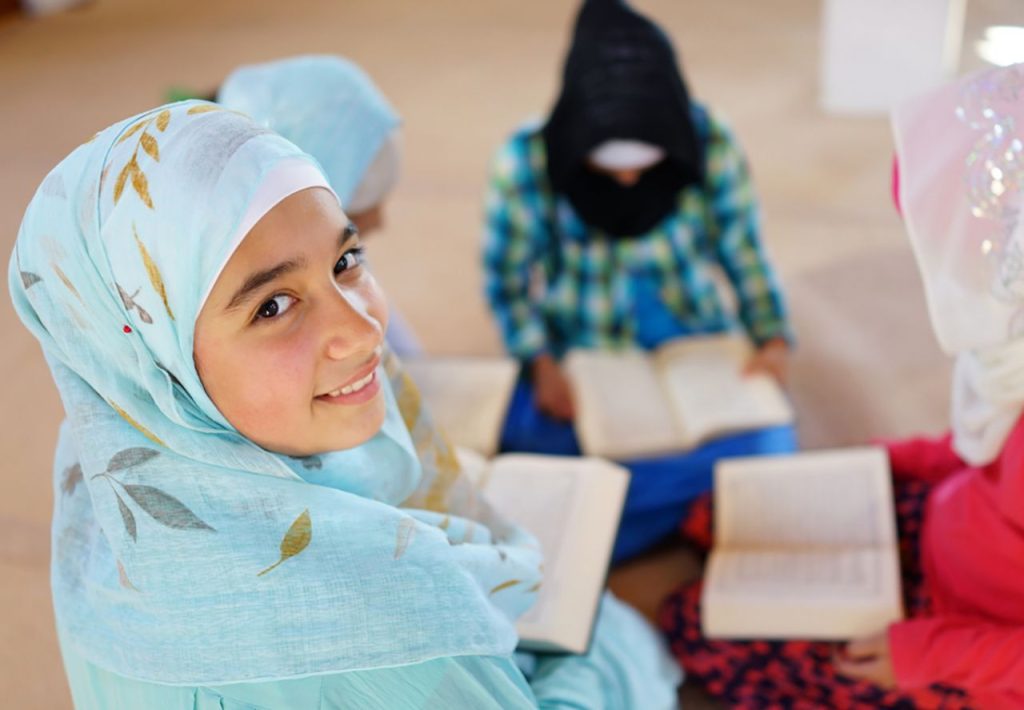Compassion in Action: How Islamic Philanthropy Supports Needy Children
as Islamic Philanthropy Supports Needy Children, the foundation of kindness and caring for people and the needy in Islam is piety and self-restraint, as the Noble Quran in verse 2 of Surah Al-Ma’idah refers to this matter and states: “Cooperate in matters of goodness and piety.” A Muslim should strive to meet the needs of their fellow Muslim brothers and sisters and endeavor to assist them in any way possible, for it is narrated that when a Muslim relieves the distress of another Muslim, Allah addresses them, saying, “Your reward with Me and for you is nothing less than Paradise.”

Based on the traditions and narrations, benevolence, Islamic Philanthropy Supports Needy Children, and caring for people and meeting their needs are among the highest virtues mentioned, and those who neglect the fate of their Muslim brothers and sisters are criticized. Kindness to others and supporting charitable organizations to alleviate the needs of the needy is a national imperative. Beyond borders, this act of kindness holds its esteemed position. Moreover, in the Islamic tradition where Muslims are considered equals and brethren, this matter holds a special place. Islamic Philanthropy Supports Needy Children and the sincere followers of the immaculate Imams; those whose disposition and conduct are filled with goodness and solutions support needy children.
One of the most central issues in the Noble Quran is the emphasis on benevolence, kindness, and spending in the way of Allah, with over 100 verses revealed on these topics. Benevolence and charity are sometimes necessary to be openly practiced and demonstrated in public, much like prayer, while at other times, it should be done in secret to avoid being considered ostentatious; therefore, the sincerity of intention for the sake of Allah is what matters most in benevolence and charity. As Islamic Philanthropy Supports Needy Children, it reflects the essence of these principles deeply rooted in Quranic teachings.
Verses such as (Al-Baqarah: 274) emphasize that one of the acts of worship that can be done secretly and openly is charity, kindness and charity.
Indeed, the benefactors are in connection with their Creator through prayer, and they establish good relations with the servants of the Merciful God through the payment of Zakat, charity, and assistance to the needy, their hearts filled with certainty of the Hereafter. These are the prosperous servants. As Islamic Philanthropy Supports Needy Children it exemplifies this connection and commitment to both spiritual and material well-being in the Islamic ethos.
Quran says: And because of [God’s] friendship, they feed the poor, the orphan, and the captive. “We feed you for the pleasure of God and we do not ask for reward or thanks from you.
Service to the creation of God
Service to the creation of God holds great value and abundant rewards in the culture and teachings of the Quran and the Ahlul Bayt. It requires that relieving the needs of the needy and fellow believers becomes a value and a common culture. As Imam Ali (peace be upon him) beautifully articulates: “O Kumayl, instruct your family to strive for the acquisition of noble traits of character, even in the darkness of the night, by attending to the needs of people and alleviating their distress. I swear by God in Whose hand is my soul, no one can bring joy and happiness to the heart of a believer except that God, through this act of goodness, creates a kindness that swiftly rushes to aid him in times of calamity and distress, rescuing him from the torrents of affliction, just as a boat is rescued from the depths of the flood.” This ethos of service and support encapsulates the essence of Islamic Philanthropy Supports Needy Children.
Quran says: It is obligatory to help each other in good deeds. People’s support to needy people, orphans, orphans and those who have extended a helping hand.
The Qur’an also says: “God loves those who are benevolent” and how good it is for a person to be loved by God. Many times in life we do things that make God happy with us, it’s not bad, but if we want God to be happy with us, God says: Serve each other so that God will love you.
In verse seven of Surah Talaq, it is mentioned in this regard: It is upon the wealthy to spend from his wealth, and whoever is short should spend from what God has given him, God loves no one except what He has given him. God doesn’t oblige anyone beyond one’s ability, he provides ease soon after difficulty.
A few hadiths about “helping the needy”
Assisting the needy and spending for their welfare is one of the most beautiful qualities of the virtuous believers, and for this reason, it has received considerable attention in religious texts. In such a way that alongside prayers, it can be considered the most prominent form of worship emphasized in the Quran. The most significant personal effects of spending include: blessings and increase in wealth, protection from calamities, purification of the soul, forgiveness of sins, and more. Its prominent societal impacts include alleviating poverty from the face of the Islamic society, establishing economic and social justice, advancing and energizing the economic system, safeguarding the community from corruption, and preventing the spread of vice. This emphasis on charity and its transformative effects echoes the essence of Islamic Philanthropy Supports Needy Children.
In this regard, Imam Kazim (peace be upon him) says: Verily, the seal of acceptance of your actions is to fulfill the needs of your brothers and do good to them to the best of your ability, and otherwise (if you do not do this), no action will be accepted from you.
The Messenger of God (peace and blessings of Allah be upon him) said: Whoever fulfills a believer’s need, God will fulfill his many needs, the least of which is Paradise.
Imam Jafar Sadiq (peace be upon him) said: Fulfilling the needs of a believer is higher and higher than a thousand acceptable pilgrimages, freeing a thousand slaves, and sending a thousand equipped horses in the way of God.
Imam Ali (peace be upon him) said: Satisfying the needs of the people is not sustainable except for three things: 1- Minimizing the service so that God will magnify it; 2- Hiding it so that God reveals it; 3- Haste in fulfilling the needs of the needy to give pleasure.

Islamic Philanthropy Supports Needy Children
Indeed, Islamic Philanthropy Supports Needy Children encompasses a profound aspect of Islamic teachings, highlighting the importance of compassion, generosity, and support for those in need. In the Quran and the traditions of the Prophet Muhammad (peace be upon him) and his family, there are numerous references emphasizing the virtue of charity and assistance to the less fortunate. This emphasis underscores the integral role that philanthropy plays in the fabric of Islamic society, serving as a cornerstone of communal welfare and social justice.
The act of charity, or “sadaqah” in Arabic, holds a special place in Islam, as it is seen as a means of purifying one’s wealth and soul, as well as seeking the pleasure of Allah. It is not merely an obligation but a privilege for believers to extend a helping hand to those in need, whether through financial assistance, provision of basic necessities, or support for educational and healthcare initiatives. By engaging in acts of philanthropy, Muslims fulfill their duty to their fellow human beings and contribute to the betterment of society as a whole.
One of the remarkable aspects of Islamic Philanthropy Supports Needy Children is its inclusive nature, transcending boundaries of ethnicity, religion, and nationality. While the primary focus may be on supporting needy children, the benefits of Islamic philanthropy extend far beyond this demographic, encompassing entire communities and societies. By addressing the needs of vulnerable children, Islamic philanthropy lays the groundwork for their holistic development, ensuring access to education, healthcare, and opportunities for a better future.
Moreover, Islamic Philanthropy Supports Needy Children is not merely a matter of giving alms but entails a deeper commitment to social justice and equitable distribution of resources. It seeks to address the root causes of poverty and deprivation, advocating for systemic change and empowerment of marginalized communities. Through strategic investments in education, healthcare, and economic development, Islamic philanthropy aims to uplift entire populations, enabling them to break free from the cycle of poverty and achieve self-sufficiency.
In the teachings of Islam, charity is viewed as a form of worship and a means of drawing closer to Allah. As such, it is accompanied by the intention of seeking divine pleasure and earning spiritual rewards. The Quranic injunctions and prophetic traditions emphasize the importance of sincerity and humility in giving, reminding believers that true charity is not measured by the quantity of wealth donated but by the purity of intention and the compassion shown to those in need.
Furthermore, Islamic Philanthropy Supports Needy Children is deeply rooted in the concept of “zakat,” which is one of the five pillars of Islam. Zakat is a mandatory form of almsgiving that requires Muslims to donate a portion of their wealth to support the less fortunate. By fulfilling this obligation, believers purify their wealth and contribute to the welfare of society, ensuring that wealth is circulated among all members of the community and that no one is left behind in times of need.
In conclusion, Islamic Philanthropy Supports Needy Children represents a core aspect of Islamic ethics and values, reflecting the teachings of compassion, generosity, and social responsibility found in the Quran and the traditions of the Prophet Muhammad (peace be upon him). It serves as a beacon of hope for vulnerable children and marginalized communities, offering them a lifeline of support and opportunity. Through acts of charity and philanthropy, Muslims demonstrate their commitment to serving humanity and fulfilling their duty to Allah, thereby embodying the essence of Islamic principles in action.
Read more: From Food Scarcity to Abundance: Transforming Lives Through Meal Programs



